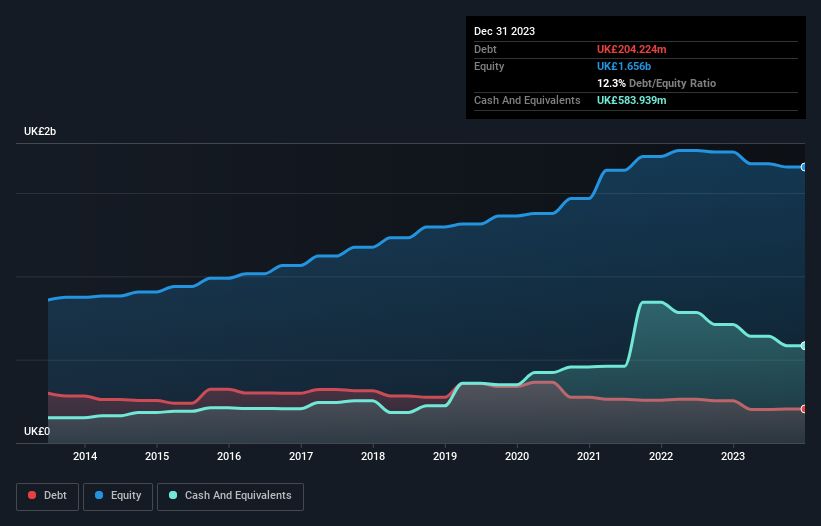- United Kingdom
- /
- Trade Distributors
- /
- LSE:GFTU
Grafton Group (LON:GFTU) Has A Pretty Healthy Balance Sheet
Legendary fund manager Li Lu (who Charlie Munger backed) once said, 'The biggest investment risk is not the volatility of prices, but whether you will suffer a permanent loss of capital.' So it seems the smart money knows that debt - which is usually involved in bankruptcies - is a very important factor, when you assess how risky a company is. Importantly, Grafton Group plc (LON:GFTU) does carry debt. But should shareholders be worried about its use of debt?
Why Does Debt Bring Risk?
Debt and other liabilities become risky for a business when it cannot easily fulfill those obligations, either with free cash flow or by raising capital at an attractive price. If things get really bad, the lenders can take control of the business. While that is not too common, we often do see indebted companies permanently diluting shareholders because lenders force them to raise capital at a distressed price. By replacing dilution, though, debt can be an extremely good tool for businesses that need capital to invest in growth at high rates of return. The first step when considering a company's debt levels is to consider its cash and debt together.
Check out our latest analysis for Grafton Group
What Is Grafton Group's Debt?
As you can see below, Grafton Group had UK£204.2m of debt at December 2023, down from UK£253.5m a year prior. But it also has UK£583.9m in cash to offset that, meaning it has UK£379.7m net cash.

How Healthy Is Grafton Group's Balance Sheet?
According to the last reported balance sheet, Grafton Group had liabilities of UK£493.0m due within 12 months, and liabilities of UK£657.8m due beyond 12 months. Offsetting this, it had UK£583.9m in cash and UK£240.5m in receivables that were due within 12 months. So its liabilities total UK£326.3m more than the combination of its cash and short-term receivables.
Since publicly traded Grafton Group shares are worth a total of UK£1.93b, it seems unlikely that this level of liabilities would be a major threat. However, we do think it is worth keeping an eye on its balance sheet strength, as it may change over time. Despite its noteworthy liabilities, Grafton Group boasts net cash, so it's fair to say it does not have a heavy debt load!
The modesty of its debt load may become crucial for Grafton Group if management cannot prevent a repeat of the 24% cut to EBIT over the last year. When it comes to paying off debt, falling earnings are no more useful than sugary sodas are for your health. The balance sheet is clearly the area to focus on when you are analysing debt. But ultimately the future profitability of the business will decide if Grafton Group can strengthen its balance sheet over time. So if you want to see what the professionals think, you might find this free report on analyst profit forecasts to be interesting.
Finally, a business needs free cash flow to pay off debt; accounting profits just don't cut it. Grafton Group may have net cash on the balance sheet, but it is still interesting to look at how well the business converts its earnings before interest and tax (EBIT) to free cash flow, because that will influence both its need for, and its capacity to manage debt. During the last three years, Grafton Group generated free cash flow amounting to a very robust 84% of its EBIT, more than we'd expect. That puts it in a very strong position to pay down debt.
Summing Up
Although Grafton Group's balance sheet isn't particularly strong, due to the total liabilities, it is clearly positive to see that it has net cash of UK£379.7m. And it impressed us with free cash flow of UK£220m, being 84% of its EBIT. So we don't have any problem with Grafton Group's use of debt. Of course, we wouldn't say no to the extra confidence that we'd gain if we knew that Grafton Group insiders have been buying shares: if you're on the same wavelength, you can find out if insiders are buying by clicking this link.
Of course, if you're the type of investor who prefers buying stocks without the burden of debt, then don't hesitate to discover our exclusive list of net cash growth stocks, today.
New: Manage All Your Stock Portfolios in One Place
We've created the ultimate portfolio companion for stock investors, and it's free.
• Connect an unlimited number of Portfolios and see your total in one currency
• Be alerted to new Warning Signs or Risks via email or mobile
• Track the Fair Value of your stocks
Have feedback on this article? Concerned about the content? Get in touch with us directly. Alternatively, email editorial-team (at) simplywallst.com.
This article by Simply Wall St is general in nature. We provide commentary based on historical data and analyst forecasts only using an unbiased methodology and our articles are not intended to be financial advice. It does not constitute a recommendation to buy or sell any stock, and does not take account of your objectives, or your financial situation. We aim to bring you long-term focused analysis driven by fundamental data. Note that our analysis may not factor in the latest price-sensitive company announcements or qualitative material. Simply Wall St has no position in any stocks mentioned.
About LSE:GFTU
Grafton Group
Distributes and sells building materials and construction related products in Ireland, the United Kingdom, the Netherlands, Finland, and Spain.
Flawless balance sheet, undervalued and pays a dividend.
Similar Companies
Market Insights
Community Narratives



